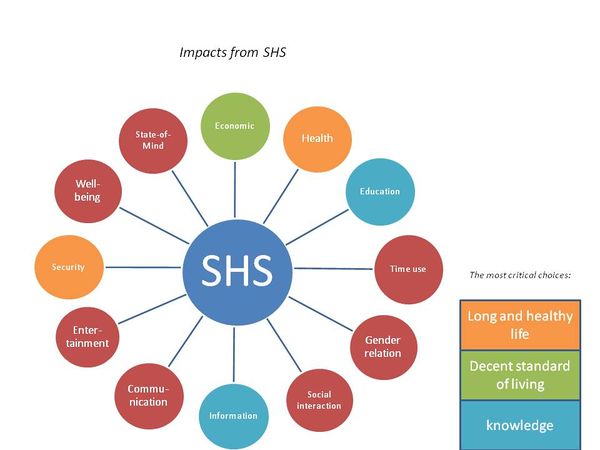Difference between revisions of "Solar Energy and Rural Development - Exploration into End-users' Impact Evaluation"
***** (***** | *****) m |
***** (***** | *****) m |
||
| (5 intermediate revisions by 2 users not shown) | |||
| Line 1: | Line 1: | ||
| + | |||
= Overview<br/> = | = Overview<br/> = | ||
| − | Under above's titel a master | + | Under above's titel a master thesis in the Postgraduate Program Renewable Energy addressed the question, in which way [[Portal:Solar|solar energy]] use impacts on rural development in off-grid areas. For this a field study was conducted in the village Rema in Amhara region, Ethiopia, which utilizes for lighting, phone charging, radio, TV and fridges. |
| + | <br/> | ||
| + | |||
| + | = Solar Energy Use Impacts<br/> = | ||
| + | An answering approach towards the question was developed with the special focus on obtaining end-user defined impacts from solar use. According to the Indian economist Amartya Kumar Sen, development can be defined as increasing people’s choices in life, referred to as capabilities (2001). The capabilities have to be defined by the people themselves, in order to make them agents of their own lifes. Therefore, a survey using qualitative methods was conducted in Rema, asking for the impacts experienced by the end users.<br/> | ||
| − | + | <br/>The impacts found were the capabilities made available by solar home systems. Those were economical improvements, health, education, self-determined time use, changes in gender relations, social interaction, information, communication, entertainment, security, well-being and changes in the people’s state-of-mind.<br/>The obtained categories were allocated towards the most basic or critical choices defined in the Human Development Reports (UNDP, 2003) and choices exceeding those related to basic needs (see figure). | |
| − | + | <br/>[[File:Results bunt.jpg|border|center|600px|Diagram of impacts from SHSs in Rema indicating the achieved choices (Orange, green and blue mark critical choices achieved. Red marks choices beyond these basic needs)|alt=Diagram of impacts from SHSs in Rema indicating the achieved choices (Orange, green and blue mark critical choices achieved. Red marks choices beyond these basic needs)]] | |
| − | <br/> | + | <br/> |
The thesis results in the conclusion, that the use of solar home systems increases the variety of user’s choices in Rema. This increase takes place for basic choices like education, health and living standard as well, as for user’s inner attitudes towards their ability to make changes in their lifes. The result can be used to develop evaluation questionnaires. For this, first recommendations have been made in the discussion part of the thesis. | The thesis results in the conclusion, that the use of solar home systems increases the variety of user’s choices in Rema. This increase takes place for basic choices like education, health and living standard as well, as for user’s inner attitudes towards their ability to make changes in their lifes. The result can be used to develop evaluation questionnaires. For this, first recommendations have been made in the discussion part of the thesis. | ||
| + | <br/> | ||
= Further Information<br/> = | = Further Information<br/> = | ||
*The full thesis can be downloaded under [http://ebookbrowse.com/masterthesis-claudia-braden-2012-pdf-d378974628 ebookbrowse.com] | *The full thesis can be downloaded under [http://ebookbrowse.com/masterthesis-claudia-braden-2012-pdf-d378974628 ebookbrowse.com] | ||
| + | *[[Portal:Solar|Portal:Solar]]<br/> | ||
| + | *[[Portal:Impacts|Portal:Impacts]]<br/> | ||
| − | + | <br/> | |
= References = | = References = | ||
| Line 27: | Line 35: | ||
<references /> | <references /> | ||
| + | [[Category:Impacts_Social]] | ||
[[Category:Ethiopia]] | [[Category:Ethiopia]] | ||
| + | [[Category:Solar_Home_Systems_(SHS)]] | ||
[[Category:Impacts]] | [[Category:Impacts]] | ||
| + | [[Category:Solar]] | ||
[[Category:Impacts_Economic]] | [[Category:Impacts_Economic]] | ||
[[Category:Impacts_Health]] | [[Category:Impacts_Health]] | ||
| − | |||
| − | |||
| − | |||
Latest revision as of 12:27, 18 July 2014
Overview
Under above's titel a master thesis in the Postgraduate Program Renewable Energy addressed the question, in which way solar energy use impacts on rural development in off-grid areas. For this a field study was conducted in the village Rema in Amhara region, Ethiopia, which utilizes for lighting, phone charging, radio, TV and fridges.
Solar Energy Use Impacts
An answering approach towards the question was developed with the special focus on obtaining end-user defined impacts from solar use. According to the Indian economist Amartya Kumar Sen, development can be defined as increasing people’s choices in life, referred to as capabilities (2001). The capabilities have to be defined by the people themselves, in order to make them agents of their own lifes. Therefore, a survey using qualitative methods was conducted in Rema, asking for the impacts experienced by the end users.
The impacts found were the capabilities made available by solar home systems. Those were economical improvements, health, education, self-determined time use, changes in gender relations, social interaction, information, communication, entertainment, security, well-being and changes in the people’s state-of-mind.
The obtained categories were allocated towards the most basic or critical choices defined in the Human Development Reports (UNDP, 2003) and choices exceeding those related to basic needs (see figure).
The thesis results in the conclusion, that the use of solar home systems increases the variety of user’s choices in Rema. This increase takes place for basic choices like education, health and living standard as well, as for user’s inner attitudes towards their ability to make changes in their lifes. The result can be used to develop evaluation questionnaires. For this, first recommendations have been made in the discussion part of the thesis.
Further Information
- The full thesis can be downloaded under ebookbrowse.com
- Portal:Solar
- Portal:Impacts
References
- A. K. Sen, Development as Freedom. New York: Alfred A. Knopf, 2001.
- United Nations Development Programme, Human Development Report, New York 2003.




















